About a month after I was there, I'm finally writing about my trip to Cuba. Most of the delay was because I've been really busy since returning to the U.S., but partly I needed to process what I learned while I was there. It was probably the most nerve-wracking and eye-opening travel experience of my life, and I still don't think I can encapsulate it in one blog post, but I will do my best.
I've been fascinated by Cuba for as long as I can remember and it was a life-long goal of mine to go there, so I was super excited as the trip approached.
However, once I got there, I felt way out of my comfort zone and as if all of the research I had done had not prepared me at all for what to expect. As I was standing in the airport in Havana waiting for my bag, I was extremely nervous, more so than I had ever felt upon entering a new country. Over the past few years, I've heard a lot of people tell me how brave I am for traveling alone like I do, but I felt anything but brave when I arrived in Cuba. Part of it was that I was already worrying about re-entering the United States because I let them stamp my passport at immigration, but it was mostly that I knew it would be so much different than any other country I'd ever been to.
Everything went pretty smoothly at the airport, I found my taxi driver with no problems, and arrived at my casa particular (which means "private home" and is a popular alternative to a hotel in which you rent a room in a local person's house for about $15-30/night). Talking to my host, Rosa, didn't do much to calm my nerves because she warned me not to get too friendly with Cubans because they had all kinds of ways of scamming tourists, which I had heard before but she made me even more nervous about it. I was so anxious at that point that I didn't even want to leave the apartment that first night, but I didn't have a choice because I was hungry and needed food. Once I was out on the street, I felt like I blatantly stood out as a tourist and was afraid to even make eye contact with anyone because I didn't know how to act or what to expect of the locals. Then at the restaurant I experienced my first example of being minorly scammed when the waiter gave me my change and it was $1 short. I noticed before I left but I was too much of a wuss to say anything.
The next two days as I was sightseeing in Havana I adjusted a little bit and felt a little less nervous, but the loneliness and sense of being out of place didn't go away. I felt disconnected from the other tourists because I never really got talking to any of them like I usually do when I travel since all of them seemed to be either in couples or families; I rarely saw solo travelers like myself wandering around. And I also felt disconnected from the locals because even though I wanted to talk to them and find out what life in Cuba was like (which is the main reason I went to Cuba in the first place), I felt like I couldn't really talk to any of them because they would just be nice to try to get money out of me somehow. I hated the feeling that I had to distrust everyone and expect them to have ulterior motives, but unfortunately a lot of the time it's true. Cubans don't make a lot of money (a typical salary for someone working for the government is $10 a month, and even a doctor makes only about $30 a month), and they know the tourists have it so they'll do whatever they can to get money out of people.
Then as I was on my way back to my casa my second full day in Havana, I met a guy who was promoting a restaurant I was walking past. He gave me the business card for the restaurant and then asked me where I was from (the typical question locals ask to try to rope you into a conversation), and when I said I lived in Orlando (the easiest answer because Florida is so close to Cuba), it turned out that was his name. So we got chatting, and I got the sense that he wasn't just after my money, that he was actually interested in talking to me, so I took the opportunity to ask him a bunch of the questions I had about life in Cuba. After we chatted for a bit, he offered to show me around some of the places I hadn't seen yet the next day. I was unsure at first, but I decided to go for it and trust my instinct that he wasn't just trying to scam me.
I was very happy when it turned out that my instinct was right and that he was a legitimately nice and honest person. He showed me around the whole next day and I learned so much from him that I wouldn't have known if I hadn't met him. I peppered him with questions about life in Cuba. If I tried to summarize all of it this post would be way too long, but the general gist of everything was that life is hard in Cuba. I never saw any evidence of oppression by force or violence, but the people are oppressed economically. The government pays extremely low wages but the prices for necessities like food and clothes are often almost as expensive as in the United States. Orlando took me to some stores, after telling me about the typical salary of $10 a month, and keeping that number in mind, I was shocked. Doing the math, it just doesn't add up. How can anyone survive on that amount of money? It made me realize exactly why the locals always seem to be trying to scam people: desperation. They are so desperate for money just to survive that they will do whatever they can think of to skim some money off the top for themselves or to push the tourists into buying things. That sort of behavior wouldn't exist if the Cuban people had enough to get by. However, despite this desperation, violent crime is pretty much non-existent in Cuba. Orlando told me that people might try to take my money, but my life would never be in danger, and it felt like that was true. I never felt physically unsafe in Cuba. I also started to feel much more comfortable once I was spending time with Orlando. It was refreshing to know that not all Cubans treated tourists simply as a way to make money, and I felt much less conspicuous walking around with a local than on my own.
Before I move on to the rest of my journey, here are some pictures of Havana. I loved the architecture there and the fact that everything is so authetically Cuban. Since there are no foreign companies in Cuba (or almost none, maybe this has started to change already), there are no fast food restaurants or chain hotels or anything interrupting the landscape. No McDonald's, no Starbucks, nothing. It was quite a nice change since it's the only country I've ever been to that didn't have any American influence.
 |
| The National Theater |
 |
| One of the main tourist streets, Calle Obispo I think. |
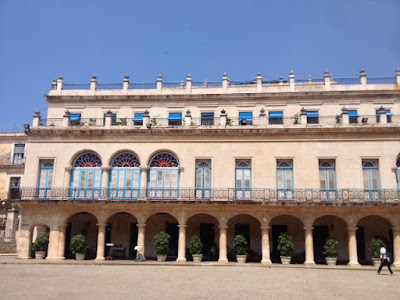 |
| Beautiful building in Habana Vieja (Old Havana) |
 |
| Notice the old American cars. I loved those! |
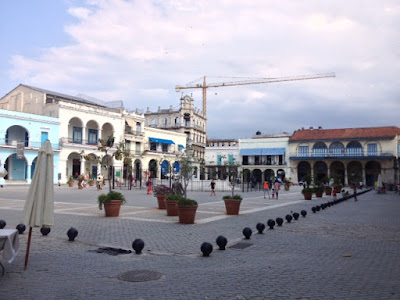 |
| One of the plazas in Habana Vieja (I can't remember which one, but I loved the buildings) |
 |
| Same plaza |
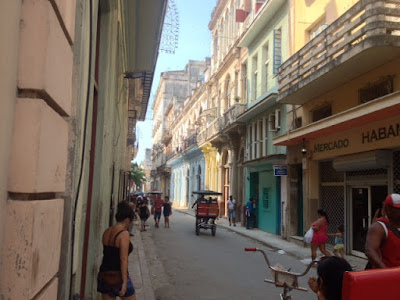 |
| Typical street in Habana Vieja |
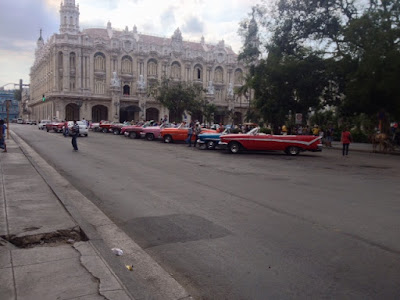 |
| Tour guides sell tours in these classic American cars, they almost convinced me to do one my first day but my frugal side won. |
 |
| More classic cars. A lot of them are used as taxis so I got to ride in several. |
 |
| El Capitolio, the capitol building, which was closed for renovation so I didn't get to go in. |
 |
| There are lots of these sorts of murals around the city commemorating Che Guevara and the other revolutionaries and extolling the virtues of socialism. |
 |
| The road I took to get from my casa to the center of town. |
 |
| El Malecon, the road along the water |
 |
| Me and my tour guide at the cigar factory I went to in Havana |
 |
| Plaza de la Revolucion (Plaza of the Revolution), building commemorating Che Guevara |
 |
| The University |
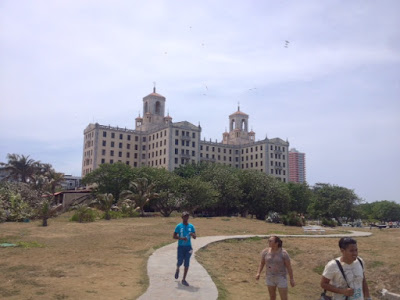 |
| Hotel Nacional (National Hotel) |
 |
| Me eating spaghetti at a street-side stall frequented by locals. These places charge in moneda nacional (national currency) instead of the CUC (convertible pesos) that tourists typically use, so the prices are much cheaper. However, at a couple places like this they refused my moneda nacional and made me pay in CUC because they knew I was a tourist. |
After Havana, I went to Viñales, a town to the west of the island where they grow a lot of tobacco (and it's suppoesdly the best in the country). My impressions of Viñales were completely different from Havana. First of all, I was much more settled in to Cuba by then so I felt much more at ease. Secondly, quality of life in Viñales seemed generally higher. I had already realized that people who work in tourism can make much more money than those who work for the state, and it seemed like everyone in Viñales works in tourism. Almost every single house is a casa particular, and many other people work in restaurants, give tours, or drive taxis, all of which pay well and have the opportunity to make tips. Just looking around the town, the houses are all nicely painted and taken care of, which wasn't the case in Havana, meaning the owners have the money to invest in keeping their homes in good condition.
Another positive of my trip to Viñales was that I met a girl from Brazil, named Ana, in the taxi on the way there, and we spent the next few days together exploring the area. It was nice to have someone to hang out with, and we bonded very quickly and had great conversations. We toured a cave together and also went on a horseback ride into the valley. That tour was fun and also very interesting because it made me realize something else about Viñales: the locals still want to get as much money out of the tourists as possible, just like in Havana, but it manifests much differently in Viñales. There, the tourist activities are set up so that you pretty much always have to take a tour to see the main attractions, or at least take a taxi to get to them, because most of what people want to see is outside of town. Then when we were on the horseback riding tour, our first stop was at a little bar/restaurant, and I felt obligated to buy something so Ana and I bought mojitos. The bartender kept asking if we wanted more rum, and I kept saying no, sort of confused about why they would be offering us more alcohol and not charging us extra money. However, that question was answered when we arrived at a tobacco farm and they also offered us mojitos, and we watched the farmer pour at least two shots worth of rum into each of our glasses. We sipped on the mojitos as he described the process of planting and harvesting tobacco and making cigars, and then the farmer offered to sell us the cigars they make at the farm. And then I realized, they want the tourists to be as drunk as possible so that they'll spend a lot of money on cigars. Pretty smart. I managed to avoid getting hassled by pretending that Americans aren't allowed to bring cigars back with us, but Ana ended up buying some after talking the guy down to half of the original price.
I loved the natural beauty of Viñales, especially after being in a busy city like Havana. It's a small town, very easy to walk around the whole thing, and the valley is beautiful, with lots of farms surrounded by mogotes, the mountains that seem to pop suddenly out of the ground. Here are some pictures to give you a sense of the area:
 |
| The view out the front door of my casa |
 |
| The houses were so cute and colorful |
 |
| Mogotes |
 |
| Horseback riding with Ana |
 |
| A tobacco drying building |
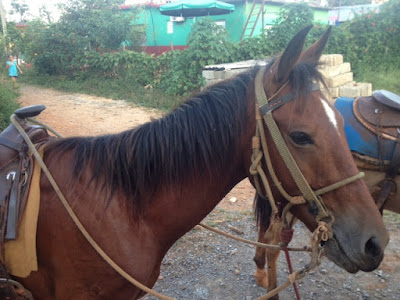 |
| My horse, Lucero, which means "bright star" |
 |
| A farm we visited where the owner sells delicious juices, as well as some food, coffee beans and other items |
 |
| Cute little Jutias |
 |
| Cool view from a short hike on the farm |
 |
| The farm |
 |
| The main street in Viñales |
 |
| The main square in Viñales |
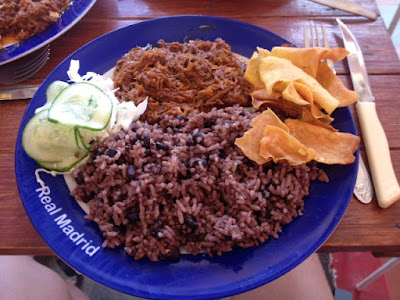 |
| Ropa vieja that I had in Viñales. It means "old clothes" but it's basically shredded pork with rice and beans, and this one came with chips as well. It was delicious and only cost about $3. Overall I didn't like the food in Cuba that much, but since I travel on a budget, I mostly went to cheaper places that sold things like pizza, spaghetti and ham and cheese sandwiches for very cheap, and the quality of that food was terrible. The food Cubans eat doesn't seem to be very healthy, and I was very glad to eat vegetables when I got back to the U.S. However, I did have some tasty food, especially in Viñales, most of which was similar to this, or had roasted chicken instead of pork. |
After Viñales, I went back to Havana and stayed one night before catching my flight to Montreal the next day. It's possible to find flights directly to the U.S. now with the loosening of the travel restrictions, but it's still more expensive so I opted for Canada even though I wasn't trying to hide the fact that I'd been to Cuba. From Montreal, I took a bus to Burlington, VT, and then stayed a night with a friend before taking another bus the next day to my dad's house in Massachusetts. Re-entering the U.S. was just as easy as all of my research told me it would be. I told the border control agent that I had been to Cuba, and the only thing she asked me was if I brought anything back with me, she didn't even ask me which of the twelve legal types of travel my trip fell under. So super easy, no need to be worried at all. Then once I was back in Massachusetts, I only had one full day before leaving to come to Montana, so I had pretty much no time to relax. When I arrived in Montana, I also only had one free day before I started my job, so the whole three weeks I've been here so far I've felt like I was catching up on things I needed to do, and settling in took a lot longer because I could only get things done in the evening.
I also felt more reverse culture shock upon returning home this time that I usually do after traveling. After seeing how tough it is for people in Cuba to scrape by, I felt overwhelmed by all of the consumerism and "stuff" that bombarded me as soon as I was back in North America. There are constantly unnecessary things for us to spend money on here, and Americans just spend money without really thinking about it on things they don't really need. Looking around at how much we take for granted in this country, and how much stuff we waste, I felt incredibly guilty that I have so much compared to so many people. There's nothing that makes me deserve it more than a Cuban person, or anyone else living in extreme poverty, I just happened to be born in a country where I have more opportunities. It took me about two weeks to totally shake that sense of guilt that was making me feel slightly disconnected yet again, this time from my own culture. Even though I'm not feeling it as acutely now, I think my outlook will always be slightly different after visiting Cuba.
That just barely scratches the surface of what I saw, learned and felt in Cuba and after my return, but I think that gives you a bit of a snapshot of my trip. If you have any questions or comments, feel free to ask me or post it in the blog comments. Since I'm not currently traveling, and I will be busy with work for the summer, I'm not sure when I will be able to write next. I may write another post about Cuba, some money-saving or travel tips, or a post about my current job, but I'm not sure when or how often I will have time to write. Thank you as always for reading and keeping up with my trip, and I will do my best to write again soon.



































So glad you got to go. The buildings are beautiful and it's like stepping back in time with all those old cars on the streets, wow.
ReplyDelete